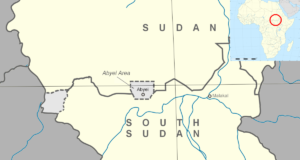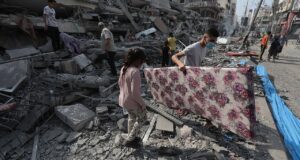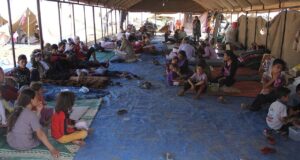By Jacob Sharpe
23rd June 2014, Policy Brief, Issue 6, No. 1.
Introduction
Since late 2012 the Central African Republic (CAR) has been plagued by sectarian violence between Muslim and Christian extremist groups. This has led to ongoing ethnic cleansing, the initial stages of genocide, and created a large-scale humanitarian crisis. Following accusations that President François Bozizé failed to follow the terms of recent peace agreements, rebels from the Séléka movement – a largely Muslim coalition – seized many towns and launched attacks against Christian civilians. In response, the mainly Christian anti-Balaka movement has begun a series of brutal reprisals against the Muslim minority.
Today, the United Nations Office for the Coordination of Humanitarian Affairs (OCHA) estimates that there are 2.5 million people in need of direct humanitarian assistance, as well as 551,600 internally displaced persons. Furthermore, approximately 133,000 refugees have fled the violence into neighbouring countries.[1] These numbers continue to climb as anti-Balaka forces continue a campaign of murder and ethnic cleansing against the Muslim community. Amnesty International has reported that the Muslim population has been forced out of their homeland in attacks that are meant to “forcibly displace these communities from the country.”[2] Pressure continued to mount regarding the tragedies occurring in the CAR, and the United Nations Security Council (UNSC) called for a Commission of Inquiry (COI) to investigate violations of human rights.[3] However, the draft findings of this report have demonstrated flaws in the UNSC’s understanding of the situation at hand, and its willingness to act decisively before the CAR descends further into chaos.
Commission of Inquiry Report
The COI’s recently released findings found evidence demonstrating violations of human rights, but downplayed the seriousness of the situation. The report concluded that whilst “ample evidence exists” of occurrences of war crimes and crimes against humanity, it is too early to suggest that “genocide is being planned or that there is any conspiracy to commit genocide or even a specific intent to commit genocide.”[4] Accusations of ethnic cleansing were also dismissed as unfounded as of this point in time.
This conclusion stands in direct opposition to the stance taken by Antonio Guterres, U.N. High Commissioner for Refugees, in comments made on the situation in the CAR this past February. He described the conflict as “massive ethno-religious cleansing.”[5] He further called for increased international intervention to prevent further indiscriminate killings and ethnic cleansing, and levels of focus equal to that given to places such as Syria and South Sudan.
The COI’s report has neglected the fact that the displacement and murder of the Muslim population is not only a result of political violence, but also a goal of anti-Balaka militias. Multiple organisations conducting humanitarian missions in the CAR have reported comments from anti-Balaka militants stating their goals to eliminate the Muslim population.[6] Refugee convoys attempting to leave the capital city have been forced back as Christian crowds jeered “we are going to kill you all!”[7] Fearing attacks upon the convoys, peacekeeping forces have not allowed these Muslims to flee.
As French and African peacekeepers protect the few remaining Muslims in multiple cities, militants loot and destroy the homes now left abandoned by thousands fleeing for their lives. Common are displays of hateful rhetoric that can be likened to that of the Interahamwe prior to the Rwandan Genocide, leaving fears that the spectre of genocide looms over the CAR.[8]
In response to this, whilst addressing some level of the current severity, the COI has failed to adequately illustrate the true seriousness of the situation. The large number of refugees forced to flee from their homes now serves as a sad testimony to the brutality of the ethnic conflict that is occurring.
A Failure of Oversight
The inadequate number of peacekeeping forces has portrayed the lack of fervour with which the UN has pursued peace in the CAR. Even more damning, however, is the lack of knowledge and oversight over African Union-led peacekeepers operating with the backing of the UN. The COI report acknowledged that there have been multiple instances in which peacekeepers who are part of the International Mission for the Support of the Central African Republic (MISCA) fired on unarmed civilians as a furtherance of the ongoing ethnic conflict.
Chadian officers who once fought with the Séléka movement had returned home following the resignation of Michel Djotodia. However, they have now re-entered the conflict as a component of MISCA, and have been tasked with maintaining peace in a conflict they perpetrated. This scenario illustrates a vast disconnect between the UN and a true understanding of the political and social realities within the region.
Protests broke out against the presence of Chadian peacekeepers in late December, shortly after their instalment in the CAR.[9] In one particular example, on March 29 peacekeepers from Chad fired indiscriminately into a market full of unarmed civilians, and continued to fire as people fled from the area. The UN High Commission on Human Rights reported that 30 people were killed and 300 were wounded as a result of the shooting.[10] Reports such as these and international condemnation forced the eventual withdrawal of Chadian soldiers. In response to the allegations, Chad’s Minister of Foreign Affairs Moussa Faki Mahamat claimed there to be a “gratuitous and malicious campaign” against Chad.[11]
The Commission of Inquiry’s report illustrates a multitude of issues that are symptomatic of humanitarian crises and intervention in Africa. There remains a massive divide between the realities of political life in much of the continent and the UN’s understanding of the region. Failure to recognize the cross-border identity of ethnic groups has served to not only create an ineffective peacekeeping force, but to perpetrate the very conflict it had hoped to stop.
Furthermore, there is little political will in the UN to commit to intervention in Africa. This has manifested itself in the hasty deployment of peacekeepers from nations such as Chad which have served as a catalyst for further violence.
Policy Proposals
As the CAR descends further into ethnic violence and genocide, options for stopping the conflict have become increasingly limited. While diplomacy between militias and political groups should continually be pursued, that option is solely a long-term solution. To stop the violence that is already occurring, these actions must be taken.
1. Support the deployment of a UN peacekeeping mission
MISCA forces have proved inadequate in dealing with the situation at hand in the CAR, and a more professional and vetted force should be prepared. Philippe Bolopion, United Nations Director at Human Rights Watch, stated to the United States Committee on Foreign Affairs, that MISCA forces were “ill-equipped and not very professional.”[12]
For a peacekeeping force to be effective, they must have adequate numbers, ample supplies, and legitimacy in the region. Protests breaking out following the insertion of Chadian peacekeepers represent clear evidence against their legitimacy, which is unacceptable in a nation with such an unstable and violent political crisis. A better trained and better equipped force from non-regional powers and less-controversial regional ones would not only be more effective, but more likely to be accepted by the people of the CAR.
The government of the CAR has proven ineffective at best in protecting its people, and the international community does have a responsibility to ensure basic human rights are maintained. Ample evidence exists to prove the existence of ethnic cleansing, and the COI’s report should not alter the action of NGOs in the region, nor should it persuade policymakers the situation is less serious than previously believed.
The threshold for legitimate international intervention was reached long ago, and an adequate peacekeeping force must be formed to meet the challenges faced in the CAR.
2. Increase the level of Humanitarian Aid
While peacekeepers are put in place to protect civilians and stop ethnic cleansing from taking place; IDPs, refugees, and any other civilians in need must be adequately cared for. OCHA’s Strategic Response Plan has called for $565 million to provide basic necessities such as education, nutrition, basic sanitation, and emergency shelter. As of early June, only $178 million has been made available for those displaced by the conflict occurring in the CAR.[13]
The strain being placed on nations such as Cameroon (recipient of nearly 100,000 refugees) must be alleviated, and proper funding must be made available. OCHA estimates that 18 months will be required to rebuild the livelihoods of many civilians in the CAR, and the rest of the world must be willing to meet these conditions. While we must dedicate resources to directly stopping the conflict and attacks against civilians, those who have already been harmed by the conflict must be reintegrated back into society.
Summary
A combination of peacekeeping forces and humanitarian aid can help us avoid the mistakes of our past. The similarities to Rwanda are striking, and all necessary steps must be taken to avoid such a tragedy. The international community is responsible for the well-being of the citizens of the CAR, and ample humanitarian aid and peacekeeping forces must be put in place.
The COI has delivered a report which drastically understates the severity of the conflict occurring, and we must act despite it. To let people be massacred under the eyes of UN peacekeepers again would be a moral and political failure, and we possess the capabilities to avoid that situation.
 Human Security Centre Human Rights and International Security Research
Human Security Centre Human Rights and International Security Research



